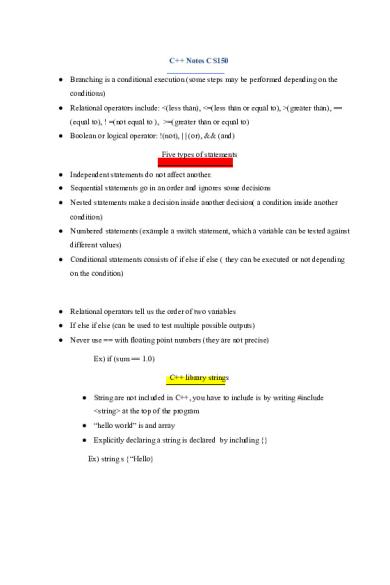C++ branching - Lecture notes ch3,ch2 PDF

| Title | C++ branching - Lecture notes ch3,ch2 |
|---|---|
| Course | C++ Programming 1 |
| Institution | Orange Coast College |
| Pages | 2 |
| File Size | 68.2 KB |
| File Type | |
| Total Downloads | 115 |
| Total Views | 168 |
Summary
Notes focus on strings, references and conditional operators and statements...
Description
C++ Notes CS150 ● Branching is a conditional execution (some steps may be performed depending on the conditions) ● Relational operators include: =(greater than or equal to) ● Boolean or logical operator: !(not), | | (or), && (and) Five types of statements ● Independent statements do not affect another. ● Sequential statements go in an order and ignores some decisions ● Nested statements make a decision inside another decision( a condition inside another condition) ● Numbered statements (example a switch statement, which a variable can be tested against different values) ● Conditional statements consists of if else if else ( they can be executed or not depending on the condition)
● Relational operators tell us the order of two variables ● If else if else (can be used to test multiple possible outputs) ● Never use == with floating point numbers (they are not precise) Ex) if (sum == 1.0) C++ library strings ● String are not included in C++, you have to include is by writing #include at the top of the program ● “hello world” is and array ● Explicitly declaring a string is declared by including {} Ex) string s {“Hello}
String raw = R”(“\hello\”)”; // “\hello\” (you can avoid escape characters with this method of string raw. ● Member functions = size ( ) , returns the length of the string , string::size_type (gets size type in the string. C++ string operations ● C++ library types act like built-in types (a difference between C++ and java) ● C++ supports copy assignment Ex) string a = “hey” , b= a // 2 string objects ● The characters inside a string can be modified unlike java ● To select individual characters of a string use : [] , at(), front(), back() At() checks the range , it can crash and tell you if your out of bounds , [] does not Front() and back() do not throw exceptions. Substrings ● Substring is a portion of an existing string . you write it like this : subst(position, length) ● You can get an error if the position > str.size() Reference ● A reference acts like a nickname for an existing variable ● A reference is not a creation of a new variable ● Indicating a reference done by adding an & between parameter’s name and type Constant references ● References refer to l-values ● References parameter can be more useful but can be a disadvantage (they don’t make a copy) . if you change the reference parameter the output parameters changes....
Similar Free PDFs

C++ - Lecture notes 12
- 7 Pages

Lecture Notes 2 c
- 2 Pages

lecture Notes Java and C
- 24 Pages

Francois Fleuret - C++ Lecture Notes
- 146 Pages

C Programming - Lecture notes 1
- 104 Pages

C++ tutorial - C++ NOTES
- 171 Pages

Unit-I C - Lecture notes 1-7
- 33 Pages

AD594 5 c - Lecture notes 5
- 8 Pages

Au-c-00315 - Lecture notes 1
- 60 Pages

C++ Builder Strings - Notes
- 15 Pages

C programming notes
- 4 Pages

C++1 - Notes for Programming in C++
- 95 Pages
Popular Institutions
- Tinajero National High School - Annex
- Politeknik Caltex Riau
- Yokohama City University
- SGT University
- University of Al-Qadisiyah
- Divine Word College of Vigan
- Techniek College Rotterdam
- Universidade de Santiago
- Universiti Teknologi MARA Cawangan Johor Kampus Pasir Gudang
- Poltekkes Kemenkes Yogyakarta
- Baguio City National High School
- Colegio san marcos
- preparatoria uno
- Centro de Bachillerato Tecnológico Industrial y de Servicios No. 107
- Dalian Maritime University
- Quang Trung Secondary School
- Colegio Tecnológico en Informática
- Corporación Regional de Educación Superior
- Grupo CEDVA
- Dar Al Uloom University
- Centro de Estudios Preuniversitarios de la Universidad Nacional de Ingeniería
- 上智大学
- Aakash International School, Nuna Majara
- San Felipe Neri Catholic School
- Kang Chiao International School - New Taipei City
- Misamis Occidental National High School
- Institución Educativa Escuela Normal Juan Ladrilleros
- Kolehiyo ng Pantukan
- Batanes State College
- Instituto Continental
- Sekolah Menengah Kejuruan Kesehatan Kaltara (Tarakan)
- Colegio de La Inmaculada Concepcion - Cebu



